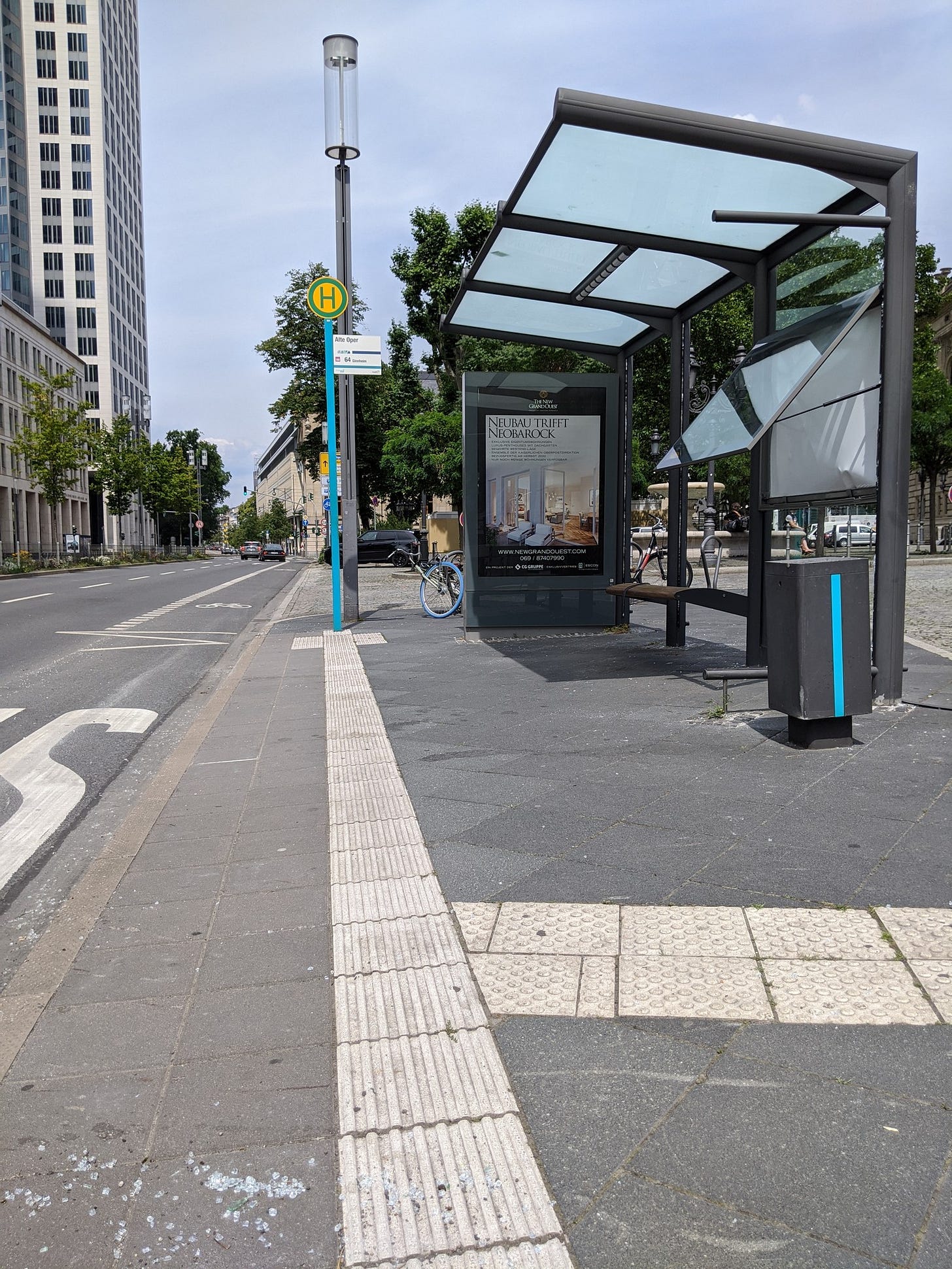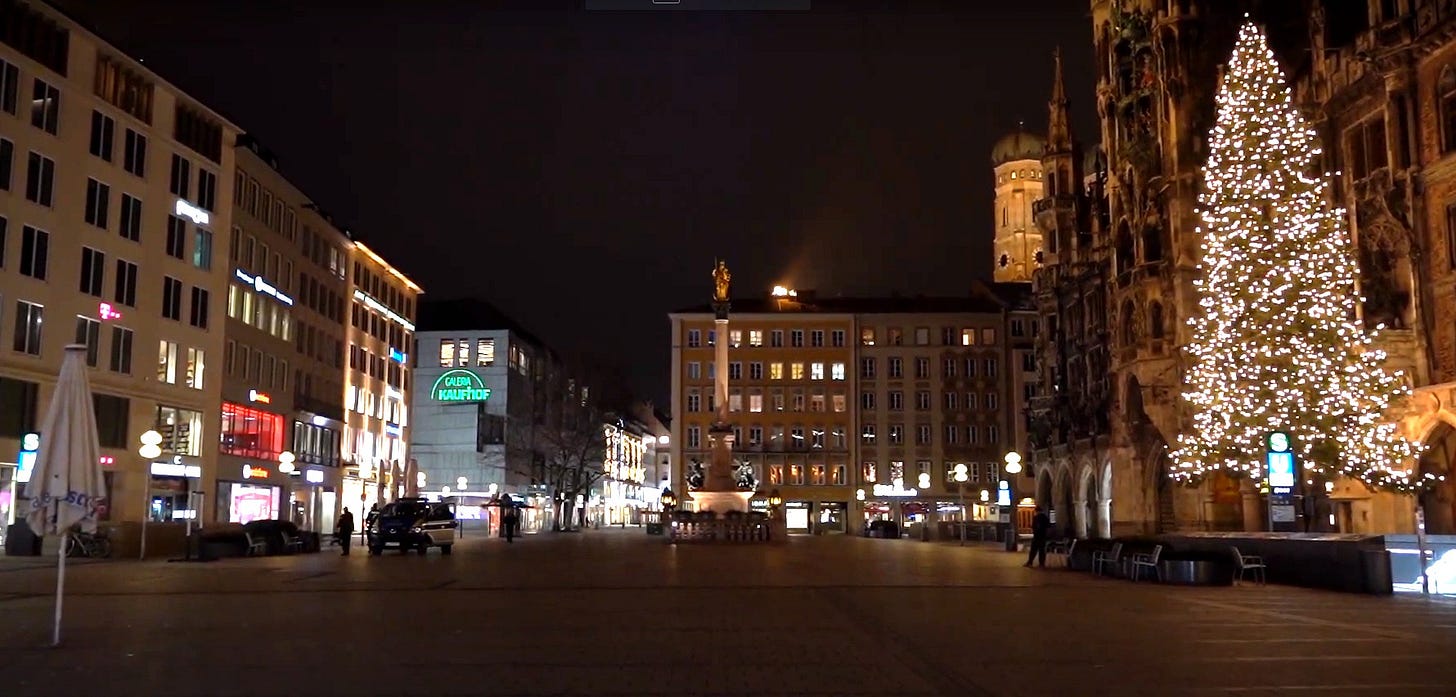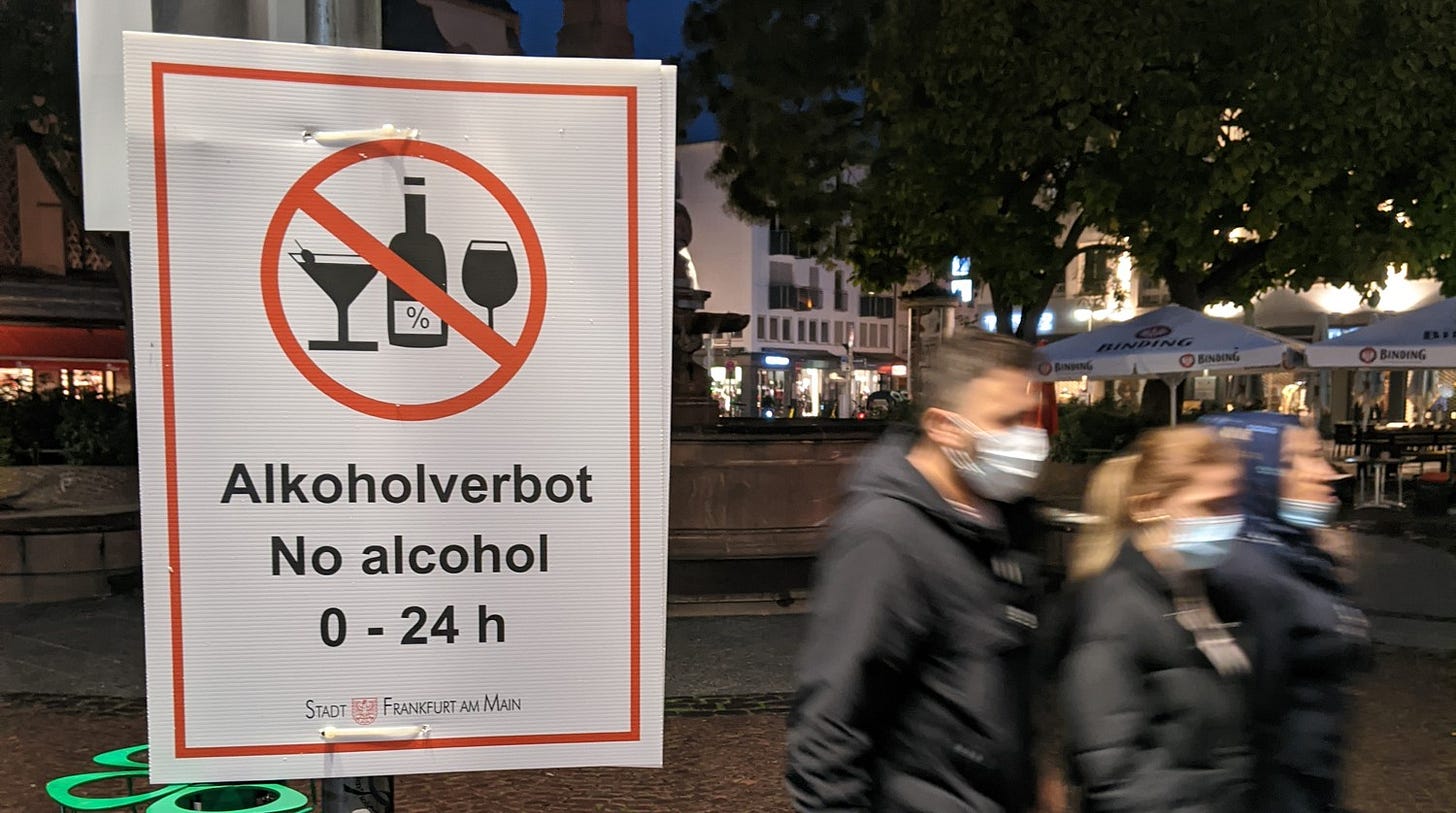Corona curfews in Germany
Several cities in Germany have nightly curfews. Some also have all-day restrictions in theory, though in practice, there’s a list of exceptions allowing people to go out.
Back in April 2020, before there were curfews, police already started to patrol cities to restrict bigger groups from meeting. At the grassy shore of the river Main in Frankfurt, a popular hang-out place when the weather is sunny, a group of police reminded people to not gather too close together. Allowed group size varied by different phases during the crisis, but generally, people from the same house hold were allowed to be together. At times, police checked identity cards.
Frankfurt, April 25, 2020.
A note on my photos: In Germany, photographing and filming the police or citizens in public is a legal gray area. It ranges from generally allowed situations, like photographing a group of people at a protest, to generally disallowed ones, like photographing the portrait of a single person without their consent. In-between — like photographing a single person at a protest — legal lines blur. Another officially allowed context is photographing events of contemporary history, to which I think documentation of the Covid crisis belongs. But at rarer times, the police’s opinion may differ.
Shortly after above picture was taken, as I still followed the police, one of them shouted at me, and after I explained the project, things calmed down again. By now I’m carrying a press pass, and for certain occasions, a cap with the word “Press” printed on it. With so far two exceptions, police always accepted it. (One exception was during a curfew, where police questioned me on why I was also filming statues. Another was during a protest by the Lateral Thinking group, where I filmed the police’s check of a medical exemption for mask wearing, the protesters only visible anonymously from behind — police asked to see my ID and camera’s contents, suggesting I filmed the protester’s faces, and further saying that “not every protest is contemporary history.”)
Frankfurt, July 19, 2020.
The first curfew I observed during in 2020 was not directly related to corona, though one can speculate if it was indirectly connected. According to media and police reports, in the night of July 19, around 2:30am in Frankfurt, a group of hundreds of people clashed with the police. Some broken glass at a bus station near an opera building was the result, as well as later, the establishing of a nightly curfew on Fridays and Saturdays for that area. Clubs at the time were already in lock-down, so people had another place less to get together. (The city of Stuttgart saw similar unrest in the night of June 20-21.)
The first curfew officially related to corona I observed was in Mannheim, a town with a population of above 300,000. Starting on December 5, 2020, from 9pm to 5am every night, people of the city were only allowed to leave the house for a list of specific reasons. I filmed there on December 6, the curfew starting at the 4-minute mark.
The list of allowed reasons for going out can vary in details or phases during the crisis, but below is a quote from the current regulation for Mannheim’s state of Baden-Württemberg:
Being outside your home is only allowed for valid reasons. For example:
At night (8 pm to 5 am):
To engage in occupational activities and important training purposes
Use of medical and veterinary services.
Accompanying individuals and minors in need of support, custody and contact rights.
Care for the dying and individuals in acute life-threatening situations.
Action taken to care for animals, e.g. taking for walks or feeding.
Attending religious services.
Events to maintain public order.
Attending meetings in accordance with article 8 of the Basic Law. [“All Germans shall have the right to assemble peacefully and unarmed without prior notification or permission.” -Ed.]
Election campaign activities, such as distributing flyers, posters or information stands are possible if approved by the authorities.
During the day (5 am to 8 pm) in addition:
Attending schools and daycare centers for emergency care.
Sport and exercise in the open air exclusively on your own, with members of your own household and with one other individual not living in the same household.
Making purchases.
Making use of services.
Attending to administrative formalities.
Blood donor appointments.
After 9pm in Munich, December 11, 2020. A police car is seen to the left.
So far I haven’t observed police checks of the daily curfew. I did observe some during the night, though. In one case, a group of people still gathered at Munich’s central Mary's Square, a location popular with tourists in non-Covid times, was dispersed by police.
An all-day alcohol ban in select places often accompanies the curfews. Munich, December 10, 2020.
There’s no curfew in Frankfurt on October 10, but alcohol is not permitted.
Other incidents where I observed enforcement of the curfew was in Berlin, during the protests around New Year’s eve. The main street starting from the Brandenburg Gate was to a large extent closed off by police. At the gate itself, a New Year’s TV show was being held, streamed but without a live audience. When police saw protesters, or people launching fireworks (which were mostly not available for sale in 2020), they often dispersed them. A police helicopter was making its rounds above.
Berlin’s Unter den Linden street on December 31, 2020, at 10:40pm.
The lone corona measures protester pictured above was confronted by the police, and then sent off. One of the cited reasons by the police was the lack of a “good reason” (“triftiger Grund”) as per the curfew regulations. The protester’s sign quotes German-Swiss psychiatrist and philosopher Karl Jaspers: “Peace is only possible through freedom, freedom only through truth. Therefore, untruth is what is actually evil, which destroys every peace.” A larger protest by the Lateral Thinking group had already been disallowed by Berlin during those nights. (One smaller protest got around the regulation by registering as religious walk the night before.)
Another group that night recorded a quick dance video. They, too, were approached by police and asked to leave. In the background, the TV station’s laser show at the Brandenburg Gate lights up the sky.








